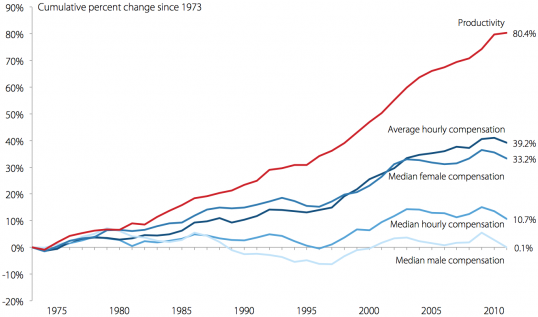Now comes a strange request from the newest “traitor to his class,” Peter Georgescu, former chairman of Young and Rubicam, the ad and media agency. In Sunday’s New York Times, Georgescu, himself a classic American success story, makes the case for taking action to ameliorate income inequality. He warns that a failure to address the problem will result in one of two awful things (likely two): sweeping social unrest (riots) or crushingly high tax rates.
Georgescu implies that Thomas Piketty’s ground breaking book Capital in the Twenty-First Century has been eye-opening for many of the nation’s self-made rich, so much so that a group of them has been conducting regular meetings to brainstorm actions that can be taken to head off the two dreaded outcomes. The group includes his friend Ken Langone of Home Depot, another successful business man who emerged from very humble beginnings. The group reflects the nation’s strivers, the ones who got up to bat and took their swings, not the ones born on third base, the George W’s and Mitts of America. This group acknowledges that all those below the top 20% of earners are struggling and probably lack sufficient funds to make a major car repair or replace their roof should the need arise.
Over the past 40 years a caste system has been established and become entrenched even though American workers have done their part and boosted productivity by 80% while being rewarded with flat-line wages. Most of the gains in productivity have gone to the owners/shareholders.

Chart via the Economic Policy Institute
Georgescu, a man who is grateful for the opportunities he himself has had, states that the employees are the “value creators”, an ennobling term that contrasts with the “taker” tag the right wing and Fox News apply to everyone who is not a business owner or mogul. He wants the employees “to share amply in productivity increases and creative innovations.”
Georgescu also wants to see businesses invest more in their own operations, including research and development and “brand building” because there’s been an overall decline in branding and assets being held. I took special note of this because it reminded me of Michigan Public Radio’s Cynthia Canty interview of Professor Ann Marie Sastry, a former University of Michigan researcher and a business developer who is well on her way to revolutionizing the battery world in ways that will advance the ways we use and save energy. During that interview last week Ms. Canty tried to get Sastry to acknowledge that the Michigan Economic Development Corporation had been a big part of her Sakti3 group’s success, but she was insistent that federal government research grants had been the bedrock of that success.
“We’re in many ways a classic example of how R & D gets out into the commercial space,” Sastry said. “The originating tech for Sakti came from my own lab when I was a professor, and it was funded by the National Science Foundation. And that was really critical.” It’s precisely this type of investment the private sector has been avoiding in favor of short term profits.
Finally, Georgescu is calling for business leaders to follow the paths already set by Home Depot, Costco, Starbucks, Gravity Payments, and others by compensating their workers more. He’s also calling for three-to-five year government tax incentives for businesses to pay more to employees earning less than $80,000/year. The effectiveness of the tax measure would be measured at the end of that time. Georgescu sees huge benefits in these steps, including the stimulative effect of more spending by large numbers of employees, a reduction in need for government assistance, and the resurrection of opportunities for our citizens to move up the economic ladder. The payoff to shareholders would be in the improved performance of workers with better morale and reasons to move their companies forward.
These steps remain within the structure of free enterprise, the system that best results in opportunity and an improved standard of living. For Georgescu’s group doing nothing is not an option.
Those at the top are beginning to see the dark economic clouds on the horizon, and those with true business ethics are taking action. It will be interesting to see who will begin the chorus of criticism of Georgescu’s call to action.
Here’s the mic, One Percenters.



